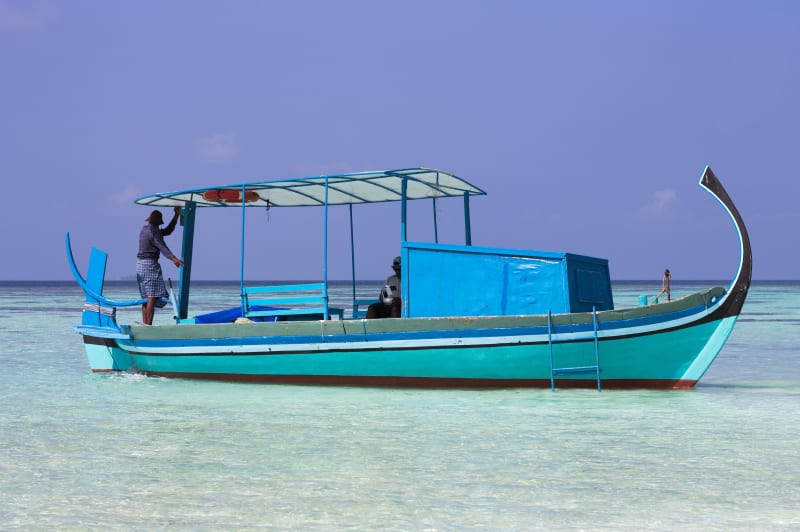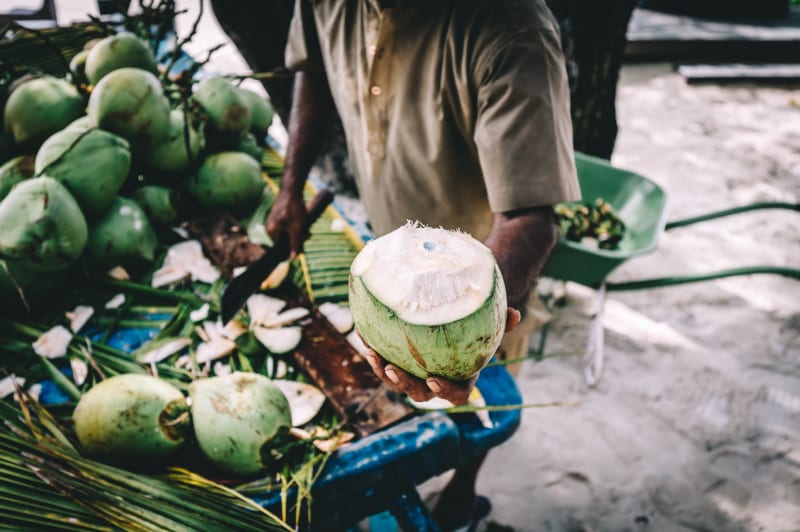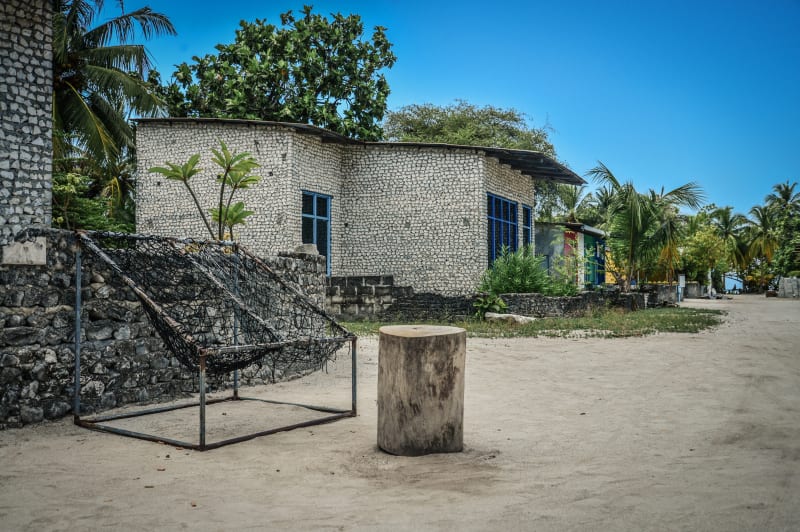The Maldives might be the flattest country in the world, but when it comes to everyday cultural encounters, the islands of the archipelago are brimming with mountain-high possibilities.
An ideal vacation in the Maldives comprises spending a few days in luxury at one of its resorts intermixed with time on inhabited islands, which come with the opportunity to engage with Maldivian society.
You can surely indulge in several local traditions while staying at a resort. Still, a stay on islands like Malé and Maafushi allows you to really appreciate the eccentricities of the Maldivian lifestyle, which is distinctly colorful and packed with enticing moments.
The best part about enjoying the must-try cultural experiences in the Maldives is that most of them are budget-friendly and, in some cases, even free.
[caption id=“attachment_8734” align=“aligncenter” width=“800”]

A fisherman prepares his dhoni in the morning.[/caption]
Go fishing with a local
Fishing adventures on a luxury yacht are no doubt fun, but when wanting a true-blue cultural experience in the Maldives, plan a trip with a resident fisherman.
After tourism, fishing is the largest industry in the Maldives, with factories and foreign investment aplenty. However, at a domestic level, it is fascinating to watch fishermen go out into the ocean early morning to catch fish for self-consumption or to sell in the markets. In fact, this is an excellent occasion to get a ride on a dhoni, the traditional Maldivian boat used by locals for fishing, and to travel between islands.
An offbeat way to set off on a fishing adventure is to approach a fisherman and ask if you can tag along. While some might take you for free, others might ask for a nominal charge. In some instances, you can also catch a ride to a nearby sandbank and get picked-up when the fisherman returns. If you don’t want to take a chance, ask your guesthouse as they have contacts with local fishermen and can arrange a fishing trip for around $30 to $50.
Ride a moped
The first thing you are likely to observe when exploring Malé is the presence of mopeds. They are everywhere, zipping past on main roads and through tiny inland streets.
Now, it is certainly not the best of ideas to hire a moped and drive around on your own, especially since Malé is small enough to discover on foot. Still, a ride on a moped is the kind of thrilling and excitement-filled cultural excursion that gives insight into how people live on the island.
So, wondering how to go about it? Well, Maldivians are very friendly and welcoming, so just strike up a conversation with a local at a Maldivian tea shop and request them to take you on a short ride.
Try an areca nut
There are several traditional Maldivian dishes worth trying when visiting the islands. However, one must-have cultural experience is trying areca nut, eaten by locals daily, typically after a meal as a stimulant.
The areca nut is a hard “fruit” of the areca palm tree, amply found across the islands. It is taken in different forms, but mostly as thin slices along with betel leaf. Dhufun is an areca nut mixture with betel leaf, cardamom, cinnamon, and cloves you can find in small packets at a neighborhood store.
Areca nut is an acquired taste and if eating for the first time, opt for a mixture that has sugar in it to ease the otherwise bitter nature of the concoction.
[caption id=“attachment_8735” align=“aligncenter” width=“800”]

Fresh coconut water at a Maldivian beach.[/caption]
Drink refreshing coconut water
Sometimes the** simplest of pleasures** in life give us the most satisfaction. Coconut, as expected, plays an integral part in Maldivian day-to-day life. The residents make it a point to use every aspect of the tree, whether in food, to make art, or coir ropes.
You can enjoy the diversity of a coconut tree at a basic level by having some refreshing coconut water that costs less than $1. Coconut water is terrific for the tummy, a natural thirst-quencher, and especially cooling on a hot day.
Coconuts are available at resorts, in small eateries, and along the beach. Coconut water is best had fresh before it’s been out in the air for too long. That is why the coconut is cut open in front of you, and you can drink the slightly sweet water straight from the source.
Take a cooking class
Even if cooking isn’t something you do regularly back home, there are a couple of good reasons for taking a cooking class in the Maldives. Firstly, the preparations are a beautiful fusion of different cuisines, from Indian and Sri Lankan to Arabic and Indonesian.
More importantly, Maldivian food is delightfully simple, made using limited ingredients. As a result, the focus is on flavors and cooking techniques, making it easy to whip up a yummy Maldivian meal once you are back home.
Resorts have cooking classes for their guests, either included in their stay or at an extra cost. If staying on an inhabited island, check with your guesthouse or hotel reception, who will arrange one for you without a problem.
Learn Bodu Beru
Translated from Dhivehi, Bodu Beru literally means “Big Drums.” A music and dance ritual, there are Bodu Beru performances almost daily at resort islands as part of their evening cultural exploration events. Showcasing an East African influence, the beating of the drums, made with coconut palm wood, and subsequent dancing starts slow. Soon, though, it transforms into a fast-rhythmic euphoric celebration that will have you tapping your feet in no time.
Watching the Bodu Beru dance on the beach during sunset or by a bonfire is an invaluable introduction to Maldives’ artistic philosophy. But if you wish to immerse yourself in the culture, take a Bodu Beru lesson. It is an engaging music-filled activity for the entire family.
And suppose you are in the Maldives for a special occasion, like renewing your vows. In that case, you can incorporate a Bodu Beru procession as part of your authentic Maldivian wedding affair.
[caption id=“attachment_8736” align=“aligncenter” width=“800”]

Joalis on a beach in the Maldives - traditional seats for a perfect nap.[/caption]
Nap on a joali
Is it a hammock? Is it a chair? No! It’s a Maldivian joali, the perfect place to take a break or a nap while exploring an inhabited island. Traditionally, a joali was made with a wooden frame and Maldivian coir ropes. However, cheaper versions of the joali with a longer-lasting metal frame are becoming more common now.
You are likely to come across joalis alongside public beaches and even under trees in small residential streets. For Maldivians, it is a place to congregate, rest when the afternoon sun is burning hot, or have an animated debate about politics and life, in the evening.
While sitting on a joali might seem a little unusual at first, they are super comfortable. So, don’t be surprised if you easily drift away into dreamland when lounging on a joali by the beach, watching panoramic seascapes, and listening to the natural music of the crashing waves.
Ride the ferry
For a secluded nation in the middle of the Indian Ocean, Maldives has a surprisingly large number of transport choices. When vacationing at a resort, you will most probably take a speedboat or a seaplane to your destination, which is undoubtedly fast but expensive. Thus, a tranquil way to travel between inhabited islands is with a local ferry.
The ferries in the Maldives don’t sail on Fridays and are admittedly unpredictable. Still, boats are** cheap**, comfortable, and unhurried, because of which they are one of the best places to observe and interact with the locals.
Taking a two or three-hour ferry ride will cost you less than $2. And if lucky, you might even get to witness marine life like rays and dolphins along the way, and no extra cost.
Watch an artisan at work
With tourism being the primary revenue source in the Maldives, several industries indirectly related to it are also thriving. Among them is the manufacturing of Maldivian souvenirs, typically handcrafted by artisans living on different islands.
To witness the awe-inspiring creative talents of the locals, a visit to an artisan’s home is a must. You can see them make coir ropes, miniature dhonis, joalis, or exquisite and colorful wooden souvenirs with lacquer work.
Entrepreneurial residents are going a step further and starting guesthouses where travelers can stay and take lessons in making their own lacquered vases, bowls, and wooden artifacts. It’s the perfect way to help the local economy and recognize the originality of the Maldivian people.
N.B.:* all information is correct as of the post publication date, and prices are subjected to change.*
